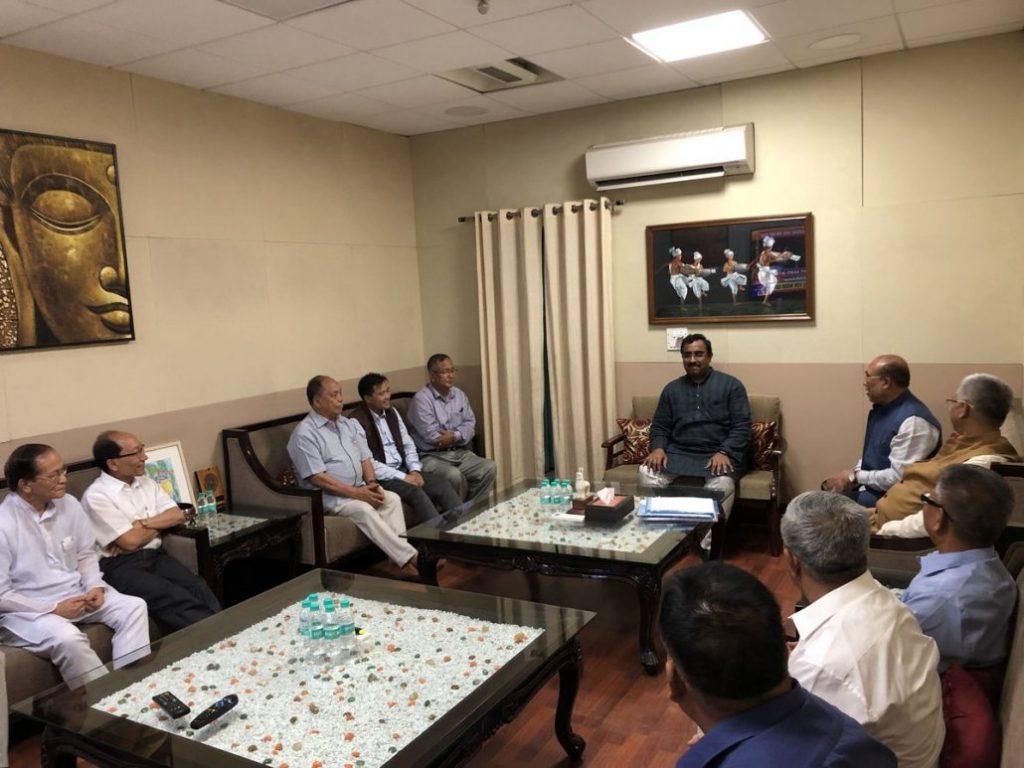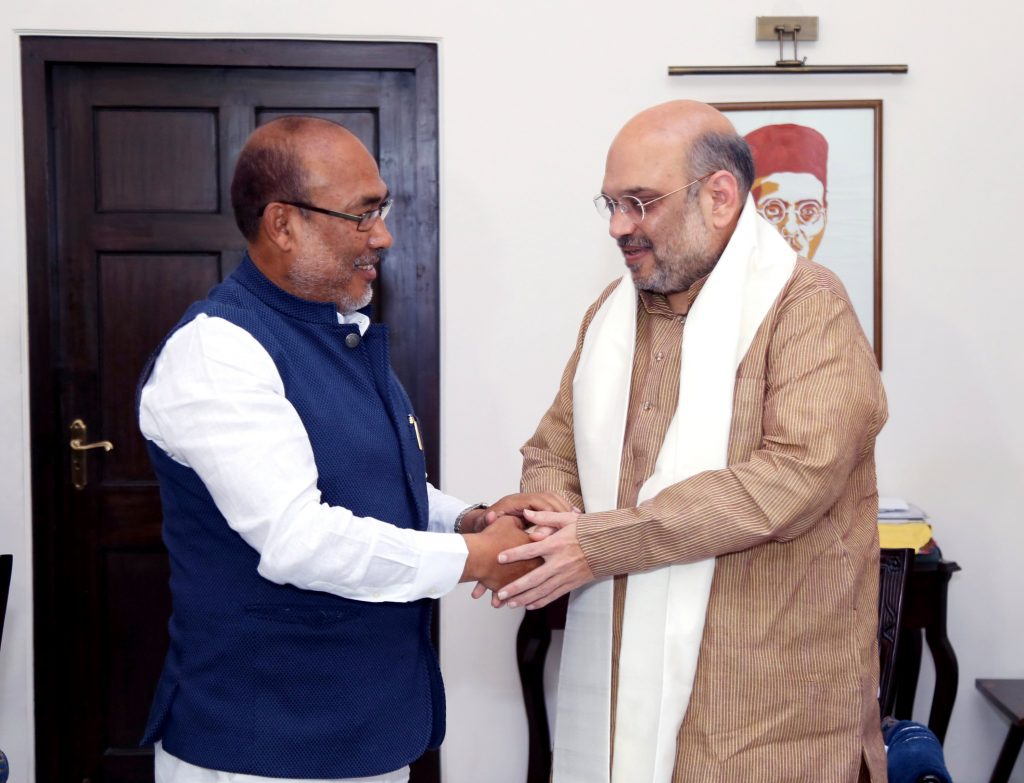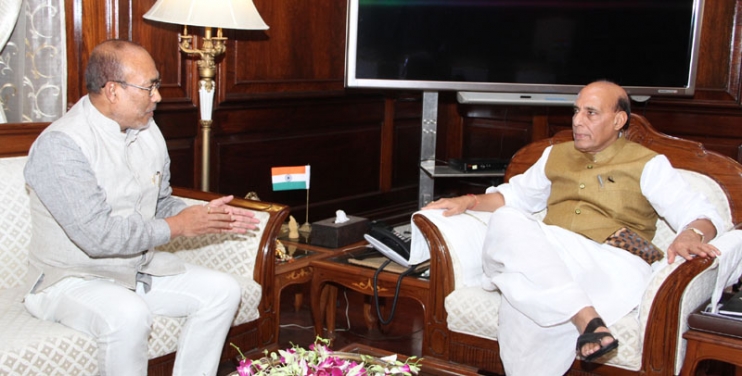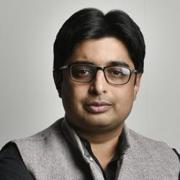In what is considered to be the most comprehensive public position taken on the proposed Naga peace accord, Manipur Chief Minister Biren Singh gave an in-depth political perspective on Manipur’s position to Prashant Jha, the National Political Editor, Hindustan Times.
With permission from the author of the interview, The Naga Republic republishes the contents of this groundbreaking interview
By Prashant Jha
Hindustan Times, New Delhi
Earlier in July, Naga insurgent group NSCN-IM had said that the integration of all the Naga inhabited areas in the northeast was an essential part of the ongoing peace talks with the central government.

BJP delegation from Manipur with BJP national general secretary, Ram Madhav in New Delhi on July 14, 2018. Source: Twitter
The chief minister of Manipur, N Biren Singh, is in Delhi with his entire cabinet to convey the state’s viewpoint to the Centre on a possible peace agreement with Naga rebel groups. He spoke to Hindustan Times about what is at stake for Manipur and the “extreme” steps they would take if the plan went ahead. Edited excerpts:
It has been four years since the Centre signed the Framework Agreement with the National Socialist Council of Nagaland (Isaak-Muivah). Reports suggest it is close to fruition. Manipur is an affected party because NSCN’s demand includes the creation of a Greater Nagaland which would include your state’s Naga-speaking hill areas. How do you see it?
Nagaland is our good neighbour. The Nagas are our good brothers. We want to see a peaceful solution of the Naga issue. We support a peaceful conclusion. But if the solution involves any part of Manipur – be it cultural, administrative, traditional, economic, territorial, or economic – then my position is very clear. The Central government must take the consent of the state assembly. If there is any involvement of Manipur in any way, in any form, we want the message to be conveyed to the state government. We will convene a state assembly for this purpose. If the assembly agrees unanimously, we can say go ahead. Otherwise, it will be very difficult.
Has the Centre told the contours of the agreement to you?
The interlocutor (RN Ravi) has come and spoken to us at times. Some officials have come. That is their routine work. We give our views. Recently, home minister Rajnath Singh convened a meeting with three CMs – of Assam, Arunachal Pradesh and me. He chaired the session. Ram Madhav-ji was there; Ravi was there; the home secretary was there. All the three CMs said that we need a consensus opinion of our states. I reiterated that we encourage a peaceful solution in the larger interest of the nation but we cannot sacrifice our state unreasonably.
The Centre has said that Manipur’s territorial integrity will be kept intact. But there could be an autonomous territorial council in Manipur or a pan-Naga cultural council across state boundaries. Would that be acceptable?
It is a very sensitive issue. In Manipur, you cannot identify that this is a Naga-inhabited area, Kuki-inhabited area, Meitei-inhabited area. It is all mixed. Whatever decision is taken, will need consensus in the assembly. The repercussions will be very, very serious. You saw what happened on June 18, 2001. The assembly was burnt. The MLAs were attacked. State, land, boundary issues are very emotional. (Eighteen people had died in protests in Manipur in 2001 after a ceasefire agreement with NSCN indicated that it would not have ‘territorial limits’).
If the solution does not lead to a change in boundaries, which was your bottom line, what is the problem?
Manipur wants development and equality. That’s why we are taking up many development works in the tribal-dominated hill areas. Since our government came into power, with the Centre’s support, we could do a lot of work in the hills. There are changes on the ground. We cannot allow someone else to come and develop on their own. There is a state government. Whatever has to be taken up must be through the state government.
So an autonomous territorial council or cultural body could undermine the state government?
I don’t want to pinpoint particular issues. Autonomous councils are already there. We can give more funds. We can discuss what we can do within the state. But for a larger change, I need the support of the assembly.

BJP National President, Shri Amit Shah meeting with Chief Minister of Manipur Shri N Biren Singh at his residence, New Delhi
Is the Bharatiya Janata Party (BJP) caught in a trap? At the Centre, it wants to solve the Naga issue and leave a legacy. It is in government in Nagaland and wants to show progress. But in Imphal, you are CM from the party and are concerned about the deal.
(Laughs) A solution has to be there. The BJP at the Centre is trying to solve the problem with peaceful means. We also want it. But the differences between the states have to be resolved. A way out will be there.
Does status quo suit you then?
You should see the change. In the hills, even Naga-inhabited areas, people are happy. If I am allowed to continue, then these demands for Greater Nagaland will not be there. I can assure you. The division will be totally solved.
So the division between the valley and the hills is healing?
Indeed, it is a God-gifted miracle. During the campaign, our PM, Union ministers, party president, said that we would do in 15 months what Congress could not do in 15 years. After swearing-in, my only concern was how to achieve this. I wondered what to do. There was a reception for me. And when my turn came, I almost instantly, automatically, said go to the hills. We went to the hills, announced packages and schemes. In Ukhrul, where the NSCN is active, a big crowd received me. There was a big public gathering. There were two spots on the stage for me to speak. One was a bulletproof screen. But I decided to speak from the open space. If trust is there, there is no need for bulletproof screen. That was a turning point.
Are you in Delhi to warn the Centre against the Naga deal?
This time, we have come in a full team – with all ministers, MLAs, and senior party leaders including the state president. We are about 35 people. We will stay here for four-five days. We are here to request the Centre that we support the peace initiative. But in the meantime, there is a state, there is a constitutional scheme, there is a federal structure, and so if there is any decision, please convey to us in advance so that we can take a decision in the assembly. If not, then all elected members, including me, will be an in an extreme position.
You will resign?
We might. The state is very important. We have a 2,000-year-old history. We got independence on August 14, 1947; India got independence on August 15. We formally merged in 1949. We have a history we cannot ignore. There is a pulse, an emotion of the people we cannot ignore. Maintaining our identity is very important. Of course, nation is also important. All we are saying is please do consult us.

The Chief Minister of Manipur, N. Biren Singh calling on the Union Home Minister, Rajnath Singh, in New Delhi.
You want a veto power over the deal?
Yes. If the state assembly does not agree, it should not happen.
And if they go ahead, you will resign and rebel?
No alternative. If it hurts the sentiment of the people, involves part and parcel of the state in any way, we might be compelled.
So even administrative reconfiguration is not acceptable?
Even now, the state government does not have power in 90% of the area. Within our total territory, 90% of the area is under the hills. It is already protected under Article 371C, which means no one can settle there. But Meitei people are living in eight percent of the area. There is already a misunderstanding between the communities because of this. If after this, the state government or Meitei people are asked to make sacrifices without consulting them, that is not justice.
When you conveyed this to party leaders, what has been the response?
Most of our leaders have understood Manipur’s situation. Earlier, they didn’t. They are very sensitive. They are pleading and putting out facts about Manipur – how it was established, present situation, the future. They are conveying this to leaders here, including the National Security Advisor. Many Delhi people do not know the situation there. Our assembly has an assembly within the assembly. Twenty tribal members, from the hill areas, are a part of the Hill Areas Committee. If we want to take any decision on the hills, we have to take clearance from them. But no one knows that.
So the party is sympathetic. Is the security establishment pushing it?
Yes… without knowing the ground reality, some people are pushing. But I am trying to convey this politically. This is a political issue. To please one state, you may lose three states. That should not happen.
Have you spoken to the Sangh also?
Yes. We have already apprised them that we are a part of the nation, we want to live together. I have urged the concerned people not to touch Manipur; and that we will do whatever is necessary for development of tribal people. They have listened. One happy point is they have tried to know the reality.
Development is one part. But what about Naga identity within Manipur, because the sense is that the state polity is dominated by Meiteis?
It is a communication gap. The longest-serving CM in Manipur was Naga. There have been two Naga CMs in the 47-year-old history of the state. One of them served for 13 years as the CM, and then served for 10 years in the Rajya Sabha. Vested interests have instigated this…But yes, there has been a problem from our part. There was a failure to redress grievances. If it had happened timely, the situation would not be there.

As the National Political Editor of the Hindustan Times, Prashant Jha covers national politics and Indian foreign policy. He is the author of Battles of The New Republic: A Contemporary History of Nepal. He is particularly interested in India’s neighbourhood, and politics in the Gangetic plains.







 The last Konyak headhunters of Nagaland
The last Konyak headhunters of Nagaland An orbiting message of peace
An orbiting message of peace The Top Viral YouTube Videos of 2017
The Top Viral YouTube Videos of 2017 Meet R.N. Ravi, who is mediating peace with the Nagas
Meet R.N. Ravi, who is mediating peace with the Nagas










Leave a Reply
Your email address will not be published. Required fields are marked (required)